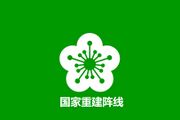National Reconstruction Front (Daxia)
The National Reconstruction Front is a centre-right big tent and founding political party of the Democratic Republic of Daxia. The NRF currently holds 13 out of 500 (2.6%) seats in the Assembly of the People and has legislative presence in four provinces but no governorships. Founded in 1946 by Dai Hanjian by agglutinating several pro-democracy movements , war veterans's associations and emerging labor organizations; the NRF maintained absolute and uninterrupted state power from 1945 to 1992 and presided over a dominant party system with no corresponding checks and balances to its authority. This system was maintained by a combination of corporatism, coercion and repression. Having being founded and led by army officers from its inception, the NRF was notably militarist, intervening in the Rusani Civil War on the side of the NCDP with the 'Little Incursion' in 1962 and helping the government of Canpei crush the democratic protests known as the Revolution of Dignity in 1984.
National Reconstruction Front 我们这件事 | |
|---|---|
| General Secretary | Trang Shesh |
| Headquarters | Mirzak, Daxia |
| Newspaper | National Voice |
| Youth wing | Nationalist Wave Association |
| Membership (2027) | 20,143 |
| Ideology | Big tent Pragmatism Dirigisme Revolutionary Nationalism |
| Colors | Light Green, White |
| Assembly of the People | 3 / 500 |
| State Assembly (Daguo) | 7 / 40 |
| State Assembly (Xing) | 4 / 40 |
| State Assembly (Sanyu) | 2 / 40 |
| State Assembly (Pingu) | 8 / 40 |
| Party flag | |
 | |
Established after Dai Hanjian's 'Glorious Revolt' that toppled monarchical rule, the NRF provided him and the military rulers after him with a wafer-thin veneer of democratic legitimacy that was renovated by elections that were never free nor fair and often without any candidates to oppose the NRF. Upon its 1992 defeat in national elections the party rapidly lost power and positions in the government bureaucracy, it was subjected to various corruption investigations (former president Tao Zexian was imprisoned for 3 years) and was eventually banned by the electoral board from 1993 to 1999. The party was greenlighted to participate in the elections of the year 2000 where it got around 2 percent of the votes cast and regained small representation in local assemblies. Ostensibly independent, the NRF has reinvented itself from being a party of power into what is now considered by political analysts to be an inconditional, submissive ally and political satellite organization of the Party of Daxian Democrats.
During its five decades in power the party went from favoring center-left, statist economic policies to preferring a more mixed model with some market oriented reforms that included privatization of certain state industries and abandoning import substitution programs. This ideological evolution however did not touch the economic interests of the Army which continued to have an outsized political and economic influence until the end of the regime. The NRF created many of Daxia's modern institutions such as the independent National Bank in charge of fiscal policy, a well funded healthcare system and the bloated security organs. The current General Secretary of the party is Trang Shesh.
History
Foundation and Qiu Heng era
Chi Long Qua era
Min Bib Doda era
Yang Qiu era and the Slow Death
Tao Zexian era and last term
Ideology
List of General Secretaries
| No. | General Secretary | Portrait | Took office | Left office |
|---|---|---|---|---|
| 1 | Qiu Heng (1902-1964) | 1951 | 1964 | |
| 2 | Chi Long Qua (1905-1972) | 1964 | 1972 | |
| 3 | Min Bib Doda (1913-1985) | 1972 | 1980 | |
| 4 | Yang Qiu (1922-1999) | 1980 | 1988 | |
| 5 | Tao Zexian (Born 1945) | 1988 | 1992 |
Electoral History
Presidential elections(1951-1988)
| Election | Party candidate | Popular vote | % | Result |
|---|---|---|---|---|
| President elected by popular vote | ||||
| 1951 | Qiu Heng | 210,653,846 | 73% | Elected |
| 1956 | 262,595,890 | 91% | Elected | |
| 1960 | 274,138,566 | 95% | Elected | |
| 1964 | Chi Long Qua | 271,252,897 | 94% | Elected |
| 1968 | 252,366,896 | 89% | Elected | |
| 1972 | Min Bib Doda | 335,483,645 | 93% | Elected |
| 1976 | 358,654,823 | 97% | Elected | |
| 1980 | Yang Qiu | 295,365,655 | 83% | Elected |
| 1984 | 225,651,211 | 69% | Elected | |
| 1988 | Tao Zexian | 278,356,983 | 52% | Elected |